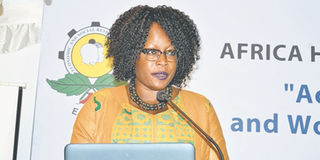Queries on expulsion of UNDP boss

Awa Dabo, former UNDP country director. PHOTO |FILE
What you need to know:
- The ministry of foreign affairs said yesterday Ms Awa Dabo was deported over what it said were sour relations with members of staff at the United Nations Development Programme (UNDP) office where she was the Country Director.
Dar es Salaam. The government’s explanation on the decision to expel a top UN diplomat from the country has left unanswered questions and opened a barrage of criticism from socio-political commentators.
The ministry of foreign affairs said yesterday Ms Awa Dabo was deported over what it said were sour relations with members of staff at the United Nations Development Programme (UNDP) office where she was the Country Director.
A statement from the ministry issued yesterday indicated that Ms Dabo’s stay was also untenable over her management and leadership which affected UNDP work in Tanzania.
The government explanation came as reports begun to circulate over the expulsion of the Gambian national who was posted to the UN agency’s station in Dar es Salaam towards the end of 2015.
“The government has directed the UNDP office in Tanzania to remove the country director Ms Awa Dabo. The decision was arrived at following misunderstanding between her and other staff and management of the organisation which has led to deterioration of its work,” read part of the statement released by the ministry’s information department.
According to the government, Ms Babo’s continued stay in Tanzania would have impacted the work of UNDP to help develop the country.
It is however the last line in the statement that gives the impression that there is more than meets the eye over the decision as it hints to a fallout between the government and UNDP office that may have nothing to do with the employee relations.
The statement says: “After assurance that she has left the country, the government through the ministry of foreign affairs has called on UNDP to let its workers know that their priority is to work with the government to fulfill its 2025 development vision and meet the Sustainable Development Goals as expounded in the 2030 UN development agenda.”
There was no immediate reaction from the UNDP office over the expulsion and it was also not clear when exactly the diplomat was asked to leave. Media reports yesterday suggested Ms Dabo was given 24 hours to leave the country.
The government’s explanation immediately attracted criticism and raised questions over the real reasons for the drastic action taken over the high ranking UN official. Some critics pointed out that the government did not have the right to intervene over an internal disciplinary matter if a clash between the UNDP boss and her juniors was concerned.
The government’s drawing of the line on the role of the UNDP country office was cited as an example that the state had something up its sleeve other than what it was ready to share with the public.
Speculations have intensified as some quarters were quickly to link the move to UNDP’s role in the Zanzibar political impasse since the botched General Election in 2015 and the subsequent re-run of the election that was however boycotted by the main opposition party, CUF. The opposition claimed it had won the elections before authorities annulled the outcome and ordered a repeat.
The government’s relation with development partners who funded a significant part of Zanzibar’s development budget has deteriorated since the elections, with several Western countries openly criticizing the manner in which the elections were handled. Donor funding commitments to both Mainland and Zanzibar have hit rock-bottom.
Yesterday Ruaha Catholic University Prof Gaudence Mpangala said it would be questionable if the reason given by the government bordered on indiscipline charges against the UNDP boss. “This issue may lead to soured relations between the government and the UN body. I believe UNDP would be the right organization to take disciplinary action if what the government is saying is to be believed,” said Prof Mpangala.
Executive director of the Legal and Human Right Centre Dr Hellen Kijo-Bisimba said the government should have reported Ms Dabo to his superiors instead of opening a case for strained diplomatic relations through the expulsion.
“Maybe there is a reason but in her position as a representative of the UN body in the country, she would stand for justice and not keep quiet should things not go well,” she said, adding:
“I would wish for my government not to expel her but report her to the UN because this matter will spoil things for us because last year the same thing applied to the representative of UNWOMEN.”
In Zanzibar, Mr Ismael Jussa who is CUF’s foreign affairs director told The Citizen he would not be surprised should the reason for Ms Dabo’s expulsion be the political problem in Zanzibar. “It is not a secret that development partners took a particular stand against what happened in Zanzibar but that move will not be the solution,” said Jussa.
Yesterday the matter found its way to Parliament when an MP raised it. However, he quickly stopped from tabling it for debate. Mbozi MP Pascal Haonga wanted the government to explain reasons behind the deportation of the official. He asked for guidance of the Chairman Andrew Chenge on why the government issued a persona non grata against Ms Dabo over the weekend.
Mr Chenge however told the House the executive had full autonomy on diplomatic relations and the Parliament can’t question the decision. His contention is backed by the Vienna convention on consular relations that gives sweeping powers to host governments to expel foreign officials.




